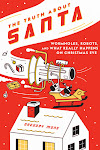"Any parent or middle-school teacher could tell you that adolescents often have, shall we say, a resistance to learning. In fact, behavioral scientists have shown that certain cognitive processes slow down through puberty. In video game tests of spatial learning, for example, middle-schoolers did not perform nearly as well as fifth-graders.
But now scientists say they have pinpointed the neurological mechanism that most likely clouds the adolescent brain, along with a possible trick for spurring those 'tween and teen neurons to start firing again."
Read the full story.
Wednesday, March 24, 2010
Tuesday, March 16, 2010
how daylight saving wears us out
Rolling the clocks forward an hour isn't just annoying...it's unhealthy.
A story I wrote Friday, after talking to some experts about the effects.
A story I wrote Friday, after talking to some experts about the effects.
reading minds
A story for AOL NEWS:
Mind-reading devices are still a thing of science fiction, but scientists can now peer into the brain and pinpoint complex memories.
In the latest issue of the journal Current Biology, researchers at University College London report using a brain scanner to effectively figure out what different people were thinking. "Given a set of memories, we could tell just from the patterns of activity in the hippocampus which memory a person was recalling," says study co-author Eleanor Maguire.
Read the rest here.
Mind-reading devices are still a thing of science fiction, but scientists can now peer into the brain and pinpoint complex memories.
In the latest issue of the journal Current Biology, researchers at University College London report using a brain scanner to effectively figure out what different people were thinking. "Given a set of memories, we could tell just from the patterns of activity in the hippocampus which memory a person was recalling," says study co-author Eleanor Maguire.
Read the rest here.
Thursday, March 4, 2010
read me the rhythm
A translator talking about meeting with the author whose book he's working on:
VK: Well, we’d go to a café and he’d say, “Just read me what you’ve got. I don’t know English, but read it to me.” And I would and he would listen for the rhythm. And if he thought the rhythm approximated that, he would be happy with that. So that’s what he would listen to, the rhythm of it, if what I was translating rhythmically matched the original.
Read it all on/in/at Quarterly Conversation.
VK: Well, we’d go to a café and he’d say, “Just read me what you’ve got. I don’t know English, but read it to me.” And I would and he would listen for the rhythm. And if he thought the rhythm approximated that, he would be happy with that. So that’s what he would listen to, the rhythm of it, if what I was translating rhythmically matched the original.
Read it all on/in/at Quarterly Conversation.
Wednesday, March 3, 2010
Quake Detectives
Just wrote a story for AOL News on the seismologists and engineers who are rushing down to Chile to study the effects of the massive quake, including the ongoing after-slip. Here's a quote from the piece:
"The first priority is human relief. People need doctors, medicine, water, food, shelter, before seismologists," seismologist Christophe Vigny of the École Normale Supérieure, an expert on the area, wrote in an e-mail. "But hopefully, we will all be there by the end of the week."
And the rest.
"The first priority is human relief. People need doctors, medicine, water, food, shelter, before seismologists," seismologist Christophe Vigny of the École Normale Supérieure, an expert on the area, wrote in an e-mail. "But hopefully, we will all be there by the end of the week."
And the rest.
Subscribe to:
Comments (Atom)

